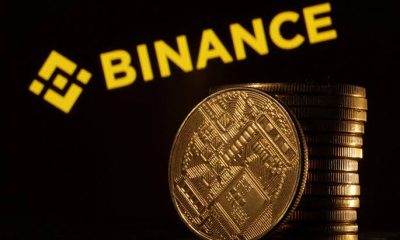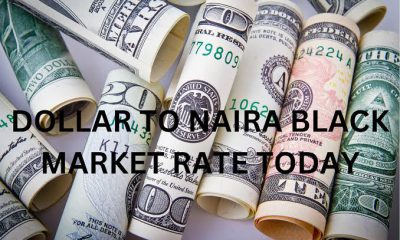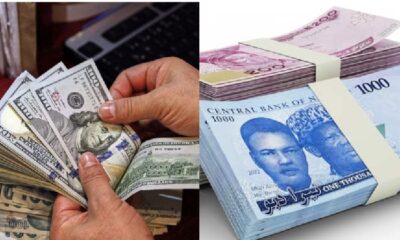
Business
Why It Is Risky To Convert Your Naira To Dollars or USD(T)

Why It Is Risky To Convert Your Naira To Dollars or USD(T)
The statistics on inflation has been released, and it stands at 17%. The most prevalent conclusion is that your money’s purchasing power has decreased by 17%.

iexclusivenews Nigeria reports that the inflation figures from different nations compared quickly – Saudi Arabia has a rate of 0.4 percent, the United Kingdom has a rate of 3.2 percent, and the United States has a “temporary” rate of 5.3 percent.

As a result, Nigerians are looking for new ways or investment vehicles to protect their hard-earned naira against depreciation.
They want their 100,000 naira to be worth 100,000 naira per month.
The current trend is for people to “purchase the dollar and keep their naira earnings.”
While this appears to be a well-thought-out plan, or hedge as we call it in finance, it has a number of faults.
Inadvertently, engaging in this type of hedging makes one a currency trader sensitive to volatility.
Foreign currency rates can fluctuate fast in response to economic and political events that occur in real time.
The inclination to buy at any price may lead you to buy at high prices, defeating the aim of “keeping value” when it reaches a negative inflection point.
The fundamentals appear to be shifting in the near future.
There are hints that the Nigerian economy may be flooded with money soon.
Nigeria has announced plans to return to the global bond market in October with the issue of a $6.2 billion Eurobond.
International book-runners for the Eurobond offering include JP Morgan, Goldman Sachs, Citigroup, and Standard Chartered, as well as Chapel Hill Denham, a local firm.
Investors should be optimistic about the Federal Government Eurobonds after Access Bank Plc’s recently oversubscribed $500 million Unsecured Eurobond received interest from top-grade investors around the world.
Nigeria’s dollar liquidity has been strengthened by the $3.35 billion it got from its portion of the IMF’s SDR (special drawing rights).
President Buhari’s recent request for a $4 billion loan, which has been hotly debated, is expected to be approved because his party holds a majority in the Senate.
The Senate President, Ahmed Lawan, gave the Senate Committee on Foreign and Local Debts one week to review the President’s loan request and report back to the Senate on Tuesday, according to iexclusivenews Nigeria.
Furthermore, there are signs that Indian refiners, Nigeria’s major consumers of oil, are increasing their run rates amid renewed optimism about the recovery in oil-products demand.
According to market reports, some refineries are intending to increase their runs to 100 percent of their capacity for the rest of the year. It’s a terrific time for Nigeria and Nigerians with oil around $74-75.
With the likelihood of liquidity support and the Central Bank’s crackdown on speculative website “abokiFX,” false pricing may soon fall apart, revealing the Naira’s true value against the dollar.
Herein lies the necessity for insight into the practice of “money conversion.”
Let’s have a look at this in more detail.
There are three principles to follow when it comes to investing.
- The goal of the investment
- Appetite for risk
- Investing time frame
Many Nigerians’ investment goal in this scenario is to keep their revenues in foreign currency.
They only care about value, not necessarily profit. Any “profit” is only a side benefit of their business.
Morgan Stanley selects the finest safe-haven currencies each year. In 2020, the US dollar was chosen as the best safe-haven currency.
The Swiss Franc and the Japanese yen are frequently considered as safe bets.
The risk appetite refers to the risk tolerance of the investor.
Can Nigerians afford to deal with the currency market’s volatility?
Will they be disappointed if they discover they bought at the peak of the naira’s appreciation?
A short look at the Central Bank’s data on monthly exchange rates over the last few years will confirm the dangers of buying USD at all times, especially during periods of high speculation.
PS: Bureau De Change (USD).
The Interbank Foreign Exchange Market (IFEM).
According to the data above, between the eighth and ninth months of 2016, US Dollars went from N396.15 to N431.10 on the black market.
After persistent values in the N400+ zone, it peaked in the second month of 2017, in February 2017.
Suddenly, a 64 Naira drop occurred the next month (March 2017), before prices rebounded to N300+ levels in the months that followed.
If you had panicked into investing during that time, you would have bought at the top and learned you were overpaying for a currency you didn’t need.
Buying when prices are high and selling when prices are low creates a predisposition to trade on noise.
So, if you bought dollars in February 2017, you’d only break even in 2021’s second half.
The third concept, the investment horizon, follows from this.
The term “investment horizon” can refer to either a short or extended time frame.
In the short term, where there’s a need for personal liquidity – engaging in hoarding dollars or speculative trading is riskier than in the long term horizon.
Using the data presented above, one with a liquidity need would have sold his dollars at a lower price.
The value of one’s earnings would have suffered the double whammy of loss in dollars and the inflation one ran away from.
In a longer time horizon, time would smoothen volatility.
In the cryptocurrency space, Nigerians are trading Naira for USD(T), USD(C), and BUSD in peer-to-peer transactions.
The above coins are referred to as stable coins “pegged” to the dollar.
According to data found on Paxful and Local Bitcoins, using a 90 day period – Nigerians traded $115,077,936, the highest volume of transactions recorded in Africa.
This excludes data from Binance, a more popular cryptocurrency exchange.
Peer to Peer transactions (P2P) appears to be the sophisticated way Nigerians are engaging in currency swaps.
Image: An example of a P2P transaction as of 16th September 2021.
It involves a willing buyer searching for a willing seller on a P2P platform.
The USD(T) seller sets a price at arbitrary rates which can vary and deviate from market rates. There are cases of people charging N800 for a dollar on these platforms.
Furthermore, there are stories of people getting duped on peer-to-peer platforms.
Naira sellers are vulnerable to fraudulent peers who might not fulfil their part of the bargain.
Buying “stable coins” in an unstable market has its valuation risk and the risk of being defrauded poses a significant threat to personal earnings.
So, what’s the way out?
Certainly not saving cash. As billionaire investor Ray Dalio puts it, “Cash is Trash.” Cash offers no real return or yield and is negatively impacted by inflation.
The investment objective of Nigerians is valid, however, the real hack is earning in foreign currencies.
Different ways to do that are by offering services on Upwork, Fiver, etc, partnering with relatives and friends in diaspora on how to channel their investments back home, and lump-sum investing in dollar-denominated assets with commercial banks and investment banks.
Another option is investing in assets and equities that offer returns higher than the inflation rate.
Last year, the Nigerian All-Share index in Africa’s largest economy recorded its best return, rising 45.7% in 2020, the most among 93 equity indexes tracked by Bloomberg.
This made it the world’s best-performing stock market. Some experts have advised the CBN to make treasury bills attractive for investors with a lower risk appetite.
The dollar has taken a beating since last year. Looking at the Dollar index, it’s far away from its highs. So Nigerians are paying a premium for cheap dollars.
Conclusively, it is advisable that if one does not have a need for dollars, engaging in precautionary and speculative demand for dollars can be counterproductive if the opportunity cost is a loss in earnings as a result of volatility.
The truth is no British citizen is monitoring exchange rates daily although you would argue the British economy is more stable.
The obsession with the exchange rate is partly responsible for why people refer to Nigeria as a “dollarized economy.”
Aggregate speculative demand for dollars leads to pressure on the FX market and inadvertently affects the exchange rate

























